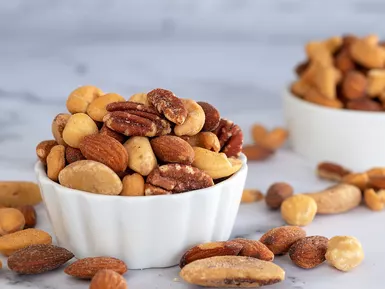What Regular Food Can Be Eaten on a Medifast Diet? Your Guide to Healthy Weight Loss

What Regular Food Can Be Eaten on a Medifast Diet? Your Guide to Healthy Weight Loss
Embarking on a weight loss journey can be both exciting and challenging. One popular approach is the Medifast Diet, which emphasizes portion control and balanced nutrition. In this blog post, we'll explore what regular food can be eaten on a Medifast Diet, delve into the science behind weight loss, and provide you with personalized strategies to help you achieve your goals. Whether you're looking to shed a few pounds or make a significant lifestyle change, this guide is for you.
Understanding the Medifast Diet
The Medifast Diet is a low-calorie, high-protein meal replacement program that helps individuals lose weight by controlling portion sizes and providing essential nutrients. It typically involves consuming five small meals or snacks per day, along with one lean and green meal. The meals are designed to be nutritionally balanced, with a focus on protein, fiber, and healthy fats.
One of the key principles of the Medifast Diet is the concept of "portion control." By eating smaller, more frequent meals, you can help regulate your appetite and prevent overeating. This can lead to a reduction in calorie intake and ultimately, weight loss.
Another important aspect of the Medifast Diet is the emphasis on protein. Protein is an essential nutrient that plays a crucial role in weight loss. It helps to build and maintain muscle mass, which can increase your metabolism and help you burn more calories throughout the day. Additionally, protein can help you feel full and satisfied, reducing the likelihood of snacking on unhealthy foods.
What Regular Food Can Be Eaten on a Medifast Diet?
While the Medifast Diet primarily consists of meal replacement shakes, bars, and other convenient options, there are also some regular foods that can be included in your diet. These foods are typically low in calories, high in nutrients, and easy to prepare. Here are some examples of regular foods that can be eaten on a Medifast Diet:
- Lean proteins: Skinless chicken breast, turkey, fish, shrimp, tofu, and low-fat dairy products are all excellent sources of lean protein. These foods can be included in your lean and green meals or as snacks throughout the day.
- Vegetables: Most vegetables are low in calories and high in fiber, making them a great addition to any weight loss diet. Some good options include broccoli, cauliflower, spinach, kale, tomatoes, cucumbers, and bell peppers. You can eat vegetables raw, steamed, roasted, or sautéed.
- Fruits: While fruits do contain natural sugars, they are also a good source of vitamins, minerals, and fiber. Some fruits that are allowed on the Medifast Diet include apples, berries, oranges, grapefruits, and bananas. You can eat fruits as a snack or include them in your lean and green meals.
- Whole grains: Whole grains are a good source of complex carbohydrates, which can provide you with energy throughout the day. Some examples of whole grains that can be eaten on the Medifast Diet include brown rice, quinoa, oats, and whole wheat bread. However, it's important to choose whole grain products that are low in added sugars and sodium.
- Healthy fats: Healthy fats are an important part of a balanced diet, as they can help to keep you feeling full and satisfied. Some good sources of healthy fats include avocados, nuts, seeds, olive oil, and coconut oil. However, it's important to choose unsalted nuts and seeds and to limit your intake of high-fat foods.
The Science Behind Weight Loss
Understanding the science behind weight loss can help you make informed decisions about your diet and exercise routine. Here are some key principles to keep in mind:
- Calorie balance: Weight loss occurs when you consume fewer calories than your body burns. To lose weight, you need to create a calorie deficit by either reducing your calorie intake or increasing your physical activity. However, it's important to create a calorie deficit that is sustainable and healthy. A good rule of thumb is to aim for a weight loss of 1-2 pounds per week.
- Metabolism: Your metabolism is the rate at which your body burns calories. It is influenced by a variety of factors, including your age, gender, genetics, and body composition. While you can't change your genetics, you can take steps to boost your metabolism, such as eating a balanced diet, getting regular exercise, and getting enough sleep.
- Hormones: Hormones play a crucial role in weight loss. Insulin, for example, is a hormone that regulates blood sugar levels. When you eat a meal that is high in carbohydrates, your body releases insulin to help transport the sugar from your bloodstream into your cells. However, if you eat too many carbohydrates, your body may store the excess sugar as fat. Other hormones that can affect weight loss include cortisol, ghrelin, and leptin.
- Psychology: Weight loss is not just about diet and exercise. It also involves changing your mindset and behaviors. Many people struggle with emotional eating, which can lead to overeating and weight gain. To overcome emotional eating, it's important to find healthy ways to cope with stress, anxiety, and other emotions. This may include exercise, meditation, or talking to a therapist.
Personalized Strategies for Weight Loss
While the Medifast Diet can be an effective way to lose weight, it's important to remember that everyone's body is different. What works for one person may not work for another. That's why it's important to personalize your weight loss strategy based on your individual needs and goals. Here are some personalized strategies that you can try:
- Set realistic goals: When setting weight loss goals, it's important to be realistic. Aim to lose 1-2 pounds per week, and don't get discouraged if you don't see results immediately. Remember, weight loss is a journey, and it takes time and effort.
- Find a support system: Losing weight can be challenging, and it's important to have a support system in place. This may include friends, family, a weight loss group, or a registered dietitian. Having a support system can help you stay motivated and on track.
- Track your progress: Tracking your progress can help you stay motivated and see how far you've come. You can track your weight, body measurements, food intake, and exercise routine using a journal, app, or online tool.
- Make healthy lifestyle changes: In addition to following a healthy diet, it's important to make other healthy lifestyle changes, such as getting regular exercise, getting enough sleep, and managing stress. These changes can help you improve your overall health and well-being, as well as support your weight loss efforts.
Overcoming Common Challenges
Weight loss is not always easy, and there are often challenges along the way. Here are some common challenges that you may face and how to overcome them:
- Cravings: Cravings are a normal part of the weight loss process, but they can be difficult to manage. To overcome cravings, try to eat a balanced diet that includes plenty of fruits, vegetables, lean proteins, and healthy fats. You can also try to distract yourself by doing something else, such as going for a walk, reading a book, or taking a bath.
- Plateaus: Plateaus are a common occurrence in weight loss. They can be frustrating, but they are also a sign that your body is adapting to your new diet and exercise routine. To overcome a plateau, try to make some small changes to your diet or exercise routine, such as increasing your intensity or adding a new type of exercise.
- Social situations: Social situations can be challenging when you're trying to lose weight. To overcome these challenges, try to plan ahead and make healthy choices. You can also try to bring your own food to social events or look for healthy options on the menu.
- Emotional eating: Emotional eating is a common problem that can lead to overeating and weight gain. To overcome emotional eating, try to find healthy ways to cope with stress, anxiety, and other emotions. This may include exercise, meditation, or talking to a therapist.
Frequently Asked Questions
-
Q: Can I eat regular food on a Medifast Diet? A: Yes, you can eat regular food on a Medifast Diet. However, it's important to choose foods that are low in calories, high in nutrients, and easy to prepare. Some examples of regular foods that can be eaten on a Medifast Diet include lean proteins, vegetables, fruits, whole grains, and healthy fats.
-
Q: How much weight can I expect to lose on a Medifast Diet? A: The amount of weight you can expect to lose on a Medifast Diet depends on a variety of factors, including your starting weight, age, gender, and activity level. However, most people can expect to lose 1-2 pounds per week on a Medifast Diet.
-
Q: Is the Medifast Diet safe? A: The Medifast Diet is generally considered safe for most people. However, it's important to talk to your doctor before starting any new diet or exercise program, especially if you have any underlying health conditions.
-
Q: Can I exercise while on a Medifast Diet? A: Yes, you can exercise while on a Medifast Diet. In fact, exercise is an important part of any weight loss program. However, it's important to start slowly and gradually increase the intensity and duration of your workouts.
Conclusion
The Medifast Diet can be an effective way to lose weight, but it's important to remember that it's not a one-size-fits-all solution. By understanding the science behind weight loss, personalizing your strategy, and overcoming common challenges, you can achieve your weight loss goals and improve your overall health and well-being. So, if you're ready to take the first step towards a healthier you, start by exploring what regular food can be eaten on a Medifast Diet and see how it can work for you.
Call to Action
If you're ready to start your weight loss journey, we encourage you to take the first step today. Try incorporating some of the regular foods mentioned in this article into your diet and see how they make you feel. You can also talk to your doctor or a registered dietitian to learn more about the Medifast Diet and whether it's right for you. Remember, every small step counts, and even the smallest changes can lead to big results over time.

5 Transformative Weight-Loss Resolutions for Success

Workout Routines & Beyond: Science-Based Weight Loss

Vitamin E and Weight Loss: Unveiling the Truth

Effective Strategies to Lose Midriff Fat for Women

8 Non-Scale Victories in Your Weight-Loss Journey

Unveiling the Ornish Diet: A Path to Sustainable Weight Loss

The Power of Social Support in Weight Loss

Personalized Weight Loss: 4 Strategies for Success

Long - Term Weight Loss: Maintaining Healthy Habits

